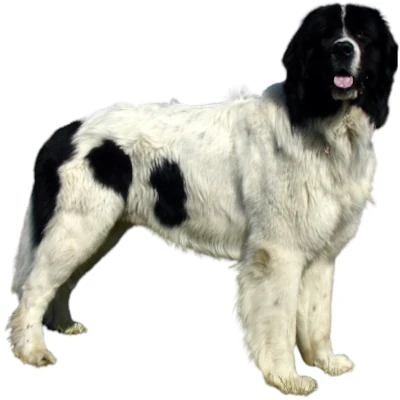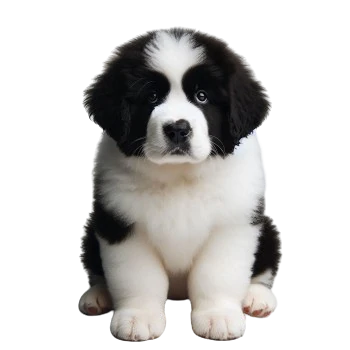
The Landseer is a dog breed originating from Europe, particularly recognized for its exceptional skills in water rescue. Closely related to the Newfoundland, this dog is appreciated for its gentle and friendly temperament, making it an excellent family companion.
The Landseer is a large dog with a massive and powerful body. It typically measures between 65 and 80 cm at the withers and has a noble appearance. Its head is broad with a well-proportioned muzzle, and its eyes are medium-sized, often a deep brown. Its ears are small, triangular, and hanging. Its athletic build allows it to be enduring and comfortable in the water, where it excels.
The Landseer's coat is dense, smooth, and slightly wavy. It has a thick undercoat that protects it from cold and water. The dominant color of its coat is white, with distinct black patches, typically distributed over the head, back, and tail. Regular grooming is necessary to prevent matting and remove dead hair.
Male Landseers usually stand between 72 and 80 cm at the withers, while females are slightly smaller, measuring between 65 and 72 cm. The weight of a Landseer can vary between 50 and 70 kg, depending on sex and physical condition. Its robust body provides considerable strength, while remaining agile in its movements.
The Landseer is known for being a calm, patient, and loyal dog. It gets along very well with children and makes an excellent family dog. Despite its large size, it is affectionate and gentle with those around it. This dog is very protective and courageous, especially when it comes to rescuing someone in danger, but remains reserved with strangers. It is intelligent and easy to train, but requires plenty of exercise to stay happy and balanced.
The Landseer is generally healthy, but like many large dogs, it can be prone to hip dysplasia and other joint problems. Regular veterinary care, a balanced diet, and daily exercise are essential for maintaining its health. Due to its affinity for aquatic environments, it's important to monitor for ear infections and properly dry its coat after each swim.

The Landseer Puppy is a large-sized dog, originally from the Canadian region, often confused with the Newfoundland. This dog is known for its calm, gentle, and affectionate temperament, as well as its high intelligence. The Landseer is an excellent swimmer and was initially used for saving lives at sea due to its strength and ability to withstand aquatic conditions. The Landseer Puppy is generally sociable, loves children, and gets along well with other pets in the household. However, like all large dogs, it requires firm and consistent training from an early age. This active dog needs regular walks and space to exercise.
The price of a Landseer Puppy can vary depending on the breeder, pedigree, and the quality of the puppy. On average, the price ranges from 1,200 to 1,800 euros.
The Landseer is a large and majestic breed, known for its gentleness and intelligence. Originating from Canada, the Landseer is often confused with the Newfoundland due to its physical similarities. Training a Landseer requires patience, consistency, and a kind approach.
Start training from an early age. Landseers are very receptive to early learning. Use positive reinforcement methods, such as treats and praise, to encourage good behaviors.
Socialization is essential. Expose your Landseer to different environments, people, and animals from a young age to make it a balanced and sociable dog.
Landseers need plenty of physical and mental exercise to stay happy and healthy. Make sure to provide stimulating activities, such as search games or regular walks, to channel their energy.
Finally, be consistent in your commands and expectations. Landseers respond well to routine and clear rules. With time and determination, your Landseer will become an obedient and loyal companion.